Organisational Behaviour Report: AM (Holdings) Ltd. Analysis
VerifiedAdded on 2020/10/05
|14
|4676
|279
Report
AI Summary
This report delves into organisational behaviour, using AM (Holdings) Limited as a case study. It examines the impact of organisational culture, politics, and power on individual and team performance. The report explores different types of culture, including role, task, person, and power cultures, and their effects on employee behaviour. It also analyses the role of positive and negative politics, and the influence of reward and coercive power. Furthermore, the report discusses various motivational theories, particularly Herzberg's Two-Factor Theory, and how hygiene and motivational factors affect employee satisfaction and performance. Finally, the report highlights the characteristics of effective and ineffective teams and provides a comprehensive overview of organisational behaviour concepts and philosophies within the context of a real-world business scenario. The report aims to provide insights into how these factors influence employee performance, motivation, and overall organisational success.
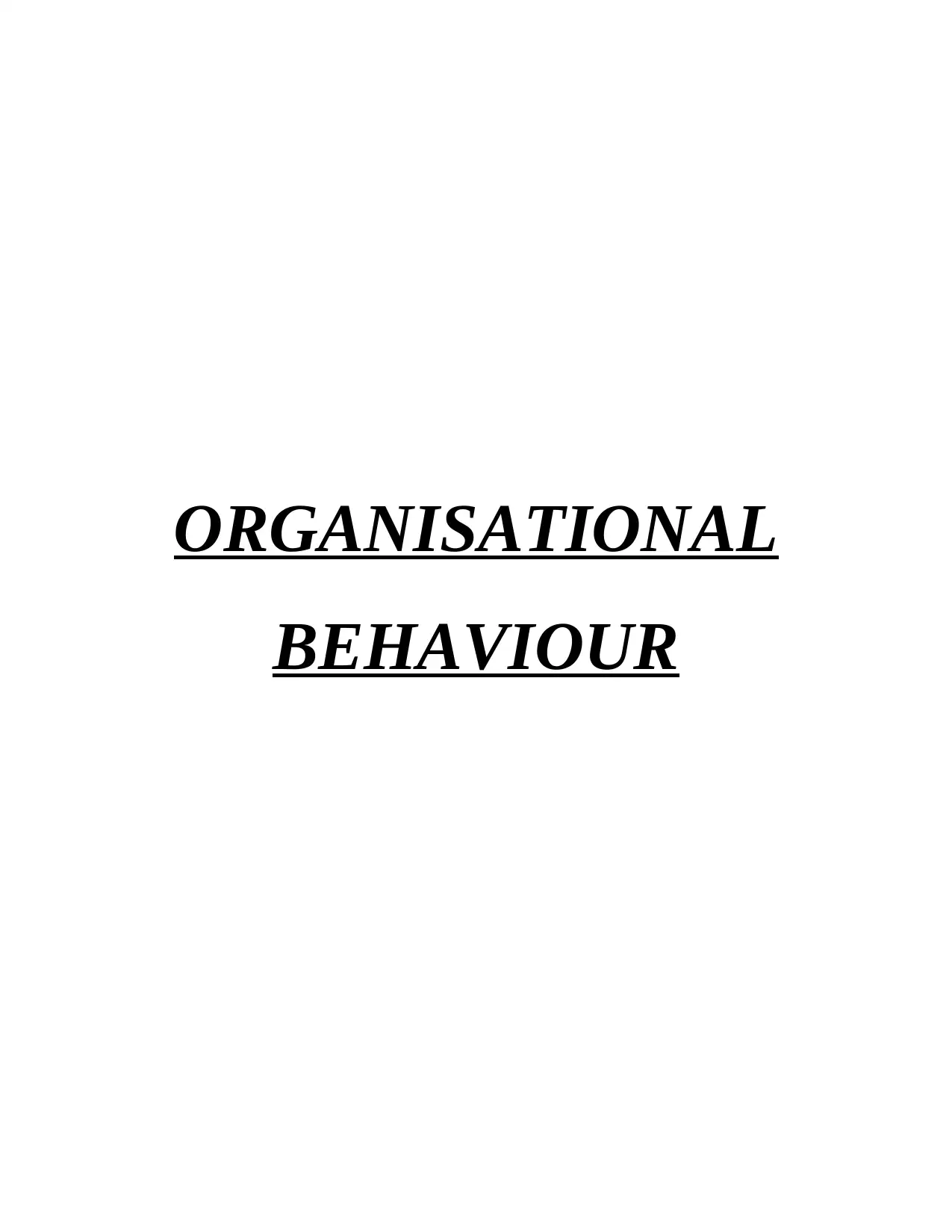
ORGANISATIONAL
BEHAVIOUR
BEHAVIOUR
Paraphrase This Document
Need a fresh take? Get an instant paraphrase of this document with our AI Paraphraser
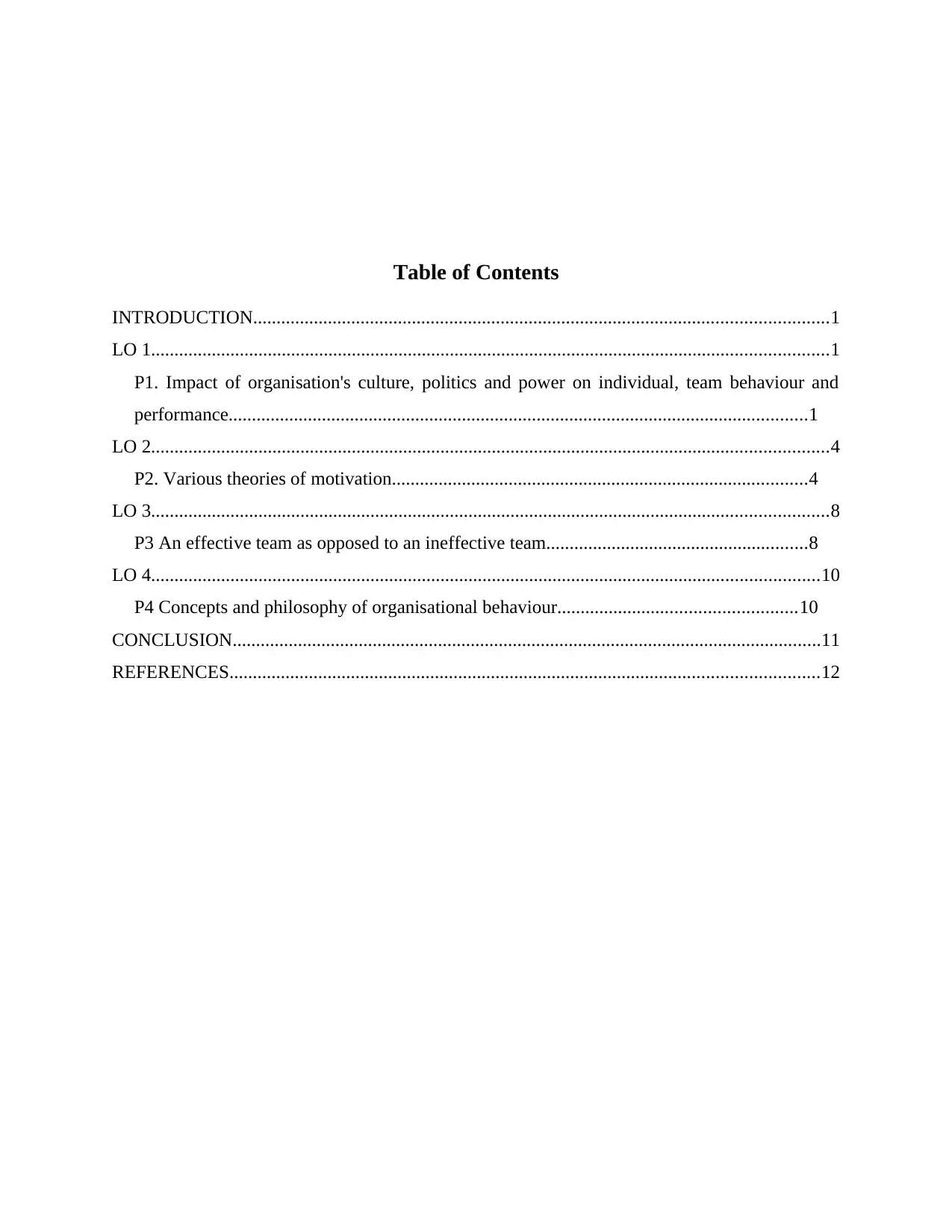
Table of Contents
INTRODUCTION...........................................................................................................................1
LO 1.................................................................................................................................................1
P1. Impact of organisation's culture, politics and power on individual, team behaviour and
performance............................................................................................................................1
LO 2.................................................................................................................................................4
P2. Various theories of motivation.........................................................................................4
LO 3.................................................................................................................................................8
P3 An effective team as opposed to an ineffective team........................................................8
LO 4...............................................................................................................................................10
P4 Concepts and philosophy of organisational behaviour...................................................10
CONCLUSION..............................................................................................................................11
REFERENCES..............................................................................................................................12
INTRODUCTION...........................................................................................................................1
LO 1.................................................................................................................................................1
P1. Impact of organisation's culture, politics and power on individual, team behaviour and
performance............................................................................................................................1
LO 2.................................................................................................................................................4
P2. Various theories of motivation.........................................................................................4
LO 3.................................................................................................................................................8
P3 An effective team as opposed to an ineffective team........................................................8
LO 4...............................................................................................................................................10
P4 Concepts and philosophy of organisational behaviour...................................................10
CONCLUSION..............................................................................................................................11
REFERENCES..............................................................................................................................12
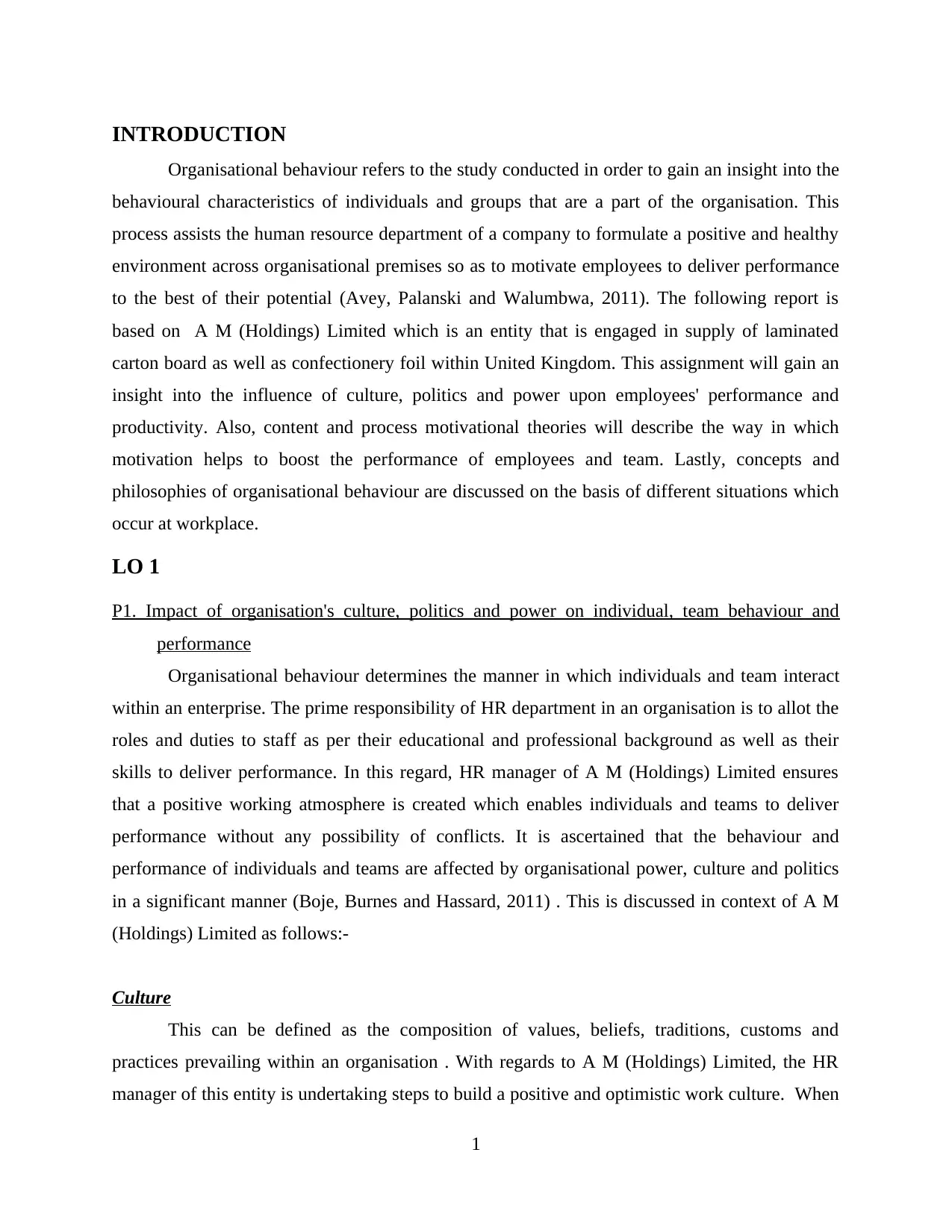
INTRODUCTION
Organisational behaviour refers to the study conducted in order to gain an insight into the
behavioural characteristics of individuals and groups that are a part of the organisation. This
process assists the human resource department of a company to formulate a positive and healthy
environment across organisational premises so as to motivate employees to deliver performance
to the best of their potential (Avey, Palanski and Walumbwa, 2011). The following report is
based on A M (Holdings) Limited which is an entity that is engaged in supply of laminated
carton board as well as confectionery foil within United Kingdom. This assignment will gain an
insight into the influence of culture, politics and power upon employees' performance and
productivity. Also, content and process motivational theories will describe the way in which
motivation helps to boost the performance of employees and team. Lastly, concepts and
philosophies of organisational behaviour are discussed on the basis of different situations which
occur at workplace.
LO 1
P1. Impact of organisation's culture, politics and power on individual, team behaviour and
performance
Organisational behaviour determines the manner in which individuals and team interact
within an enterprise. The prime responsibility of HR department in an organisation is to allot the
roles and duties to staff as per their educational and professional background as well as their
skills to deliver performance. In this regard, HR manager of A M (Holdings) Limited ensures
that a positive working atmosphere is created which enables individuals and teams to deliver
performance without any possibility of conflicts. It is ascertained that the behaviour and
performance of individuals and teams are affected by organisational power, culture and politics
in a significant manner (Boje, Burnes and Hassard, 2011) . This is discussed in context of A M
(Holdings) Limited as follows:-
Culture
This can be defined as the composition of values, beliefs, traditions, customs and
practices prevailing within an organisation . With regards to A M (Holdings) Limited, the HR
manager of this entity is undertaking steps to build a positive and optimistic work culture. When
1
Organisational behaviour refers to the study conducted in order to gain an insight into the
behavioural characteristics of individuals and groups that are a part of the organisation. This
process assists the human resource department of a company to formulate a positive and healthy
environment across organisational premises so as to motivate employees to deliver performance
to the best of their potential (Avey, Palanski and Walumbwa, 2011). The following report is
based on A M (Holdings) Limited which is an entity that is engaged in supply of laminated
carton board as well as confectionery foil within United Kingdom. This assignment will gain an
insight into the influence of culture, politics and power upon employees' performance and
productivity. Also, content and process motivational theories will describe the way in which
motivation helps to boost the performance of employees and team. Lastly, concepts and
philosophies of organisational behaviour are discussed on the basis of different situations which
occur at workplace.
LO 1
P1. Impact of organisation's culture, politics and power on individual, team behaviour and
performance
Organisational behaviour determines the manner in which individuals and team interact
within an enterprise. The prime responsibility of HR department in an organisation is to allot the
roles and duties to staff as per their educational and professional background as well as their
skills to deliver performance. In this regard, HR manager of A M (Holdings) Limited ensures
that a positive working atmosphere is created which enables individuals and teams to deliver
performance without any possibility of conflicts. It is ascertained that the behaviour and
performance of individuals and teams are affected by organisational power, culture and politics
in a significant manner (Boje, Burnes and Hassard, 2011) . This is discussed in context of A M
(Holdings) Limited as follows:-
Culture
This can be defined as the composition of values, beliefs, traditions, customs and
practices prevailing within an organisation . With regards to A M (Holdings) Limited, the HR
manager of this entity is undertaking steps to build a positive and optimistic work culture. When
1
⊘ This is a preview!⊘
Do you want full access?
Subscribe today to unlock all pages.

Trusted by 1+ million students worldwide
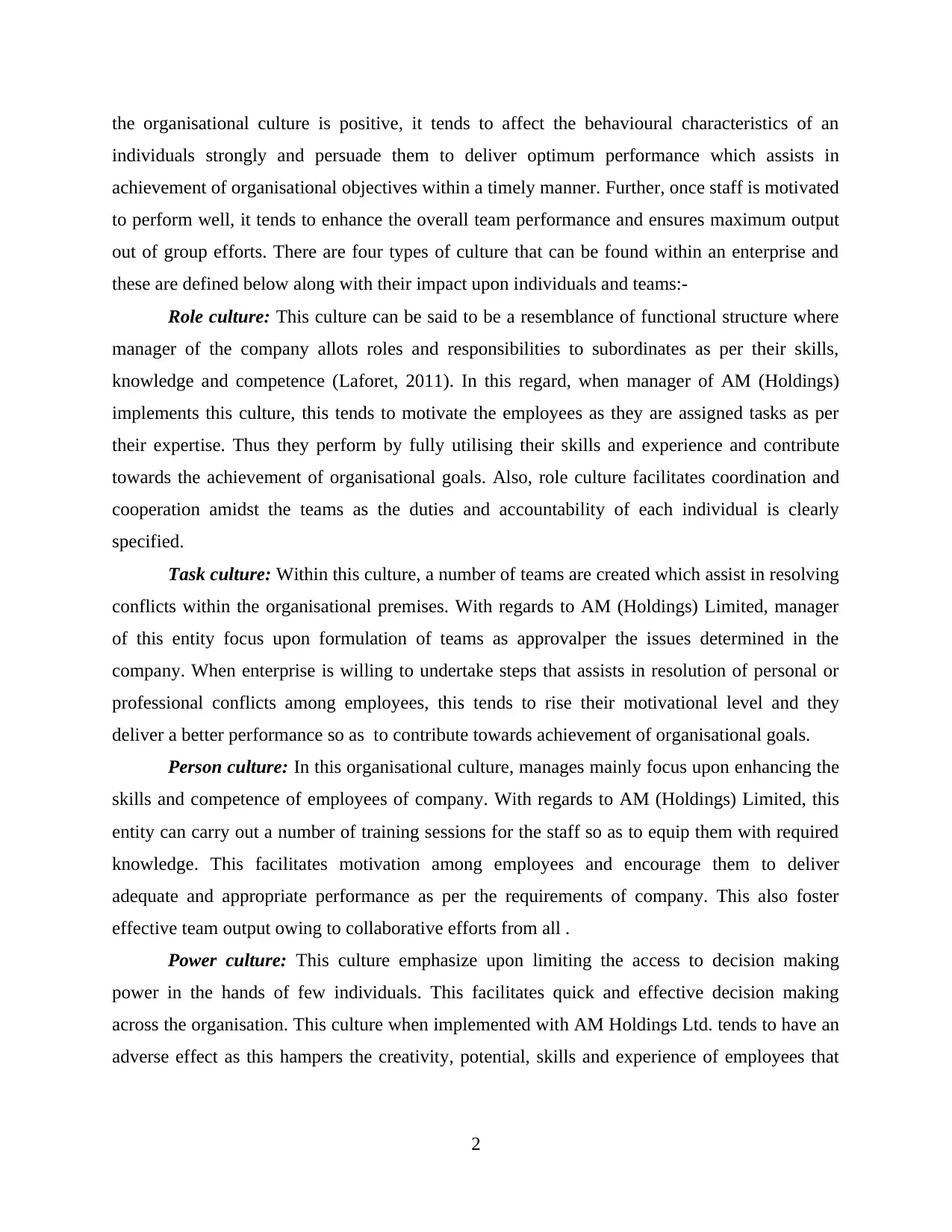
the organisational culture is positive, it tends to affect the behavioural characteristics of an
individuals strongly and persuade them to deliver optimum performance which assists in
achievement of organisational objectives within a timely manner. Further, once staff is motivated
to perform well, it tends to enhance the overall team performance and ensures maximum output
out of group efforts. There are four types of culture that can be found within an enterprise and
these are defined below along with their impact upon individuals and teams:-
Role culture: This culture can be said to be a resemblance of functional structure where
manager of the company allots roles and responsibilities to subordinates as per their skills,
knowledge and competence (Laforet, 2011). In this regard, when manager of AM (Holdings)
implements this culture, this tends to motivate the employees as they are assigned tasks as per
their expertise. Thus they perform by fully utilising their skills and experience and contribute
towards the achievement of organisational goals. Also, role culture facilitates coordination and
cooperation amidst the teams as the duties and accountability of each individual is clearly
specified.
Task culture: Within this culture, a number of teams are created which assist in resolving
conflicts within the organisational premises. With regards to AM (Holdings) Limited, manager
of this entity focus upon formulation of teams as approvalper the issues determined in the
company. When enterprise is willing to undertake steps that assists in resolution of personal or
professional conflicts among employees, this tends to rise their motivational level and they
deliver a better performance so as to contribute towards achievement of organisational goals.
Person culture: In this organisational culture, manages mainly focus upon enhancing the
skills and competence of employees of company. With regards to AM (Holdings) Limited, this
entity can carry out a number of training sessions for the staff so as to equip them with required
knowledge. This facilitates motivation among employees and encourage them to deliver
adequate and appropriate performance as per the requirements of company. This also foster
effective team output owing to collaborative efforts from all .
Power culture: This culture emphasize upon limiting the access to decision making
power in the hands of few individuals. This facilitates quick and effective decision making
across the organisation. This culture when implemented with AM Holdings Ltd. tends to have an
adverse effect as this hampers the creativity, potential, skills and experience of employees that
2
individuals strongly and persuade them to deliver optimum performance which assists in
achievement of organisational objectives within a timely manner. Further, once staff is motivated
to perform well, it tends to enhance the overall team performance and ensures maximum output
out of group efforts. There are four types of culture that can be found within an enterprise and
these are defined below along with their impact upon individuals and teams:-
Role culture: This culture can be said to be a resemblance of functional structure where
manager of the company allots roles and responsibilities to subordinates as per their skills,
knowledge and competence (Laforet, 2011). In this regard, when manager of AM (Holdings)
implements this culture, this tends to motivate the employees as they are assigned tasks as per
their expertise. Thus they perform by fully utilising their skills and experience and contribute
towards the achievement of organisational goals. Also, role culture facilitates coordination and
cooperation amidst the teams as the duties and accountability of each individual is clearly
specified.
Task culture: Within this culture, a number of teams are created which assist in resolving
conflicts within the organisational premises. With regards to AM (Holdings) Limited, manager
of this entity focus upon formulation of teams as approvalper the issues determined in the
company. When enterprise is willing to undertake steps that assists in resolution of personal or
professional conflicts among employees, this tends to rise their motivational level and they
deliver a better performance so as to contribute towards achievement of organisational goals.
Person culture: In this organisational culture, manages mainly focus upon enhancing the
skills and competence of employees of company. With regards to AM (Holdings) Limited, this
entity can carry out a number of training sessions for the staff so as to equip them with required
knowledge. This facilitates motivation among employees and encourage them to deliver
adequate and appropriate performance as per the requirements of company. This also foster
effective team output owing to collaborative efforts from all .
Power culture: This culture emphasize upon limiting the access to decision making
power in the hands of few individuals. This facilitates quick and effective decision making
across the organisation. This culture when implemented with AM Holdings Ltd. tends to have an
adverse effect as this hampers the creativity, potential, skills and experience of employees that
2
Paraphrase This Document
Need a fresh take? Get an instant paraphrase of this document with our AI Paraphraser
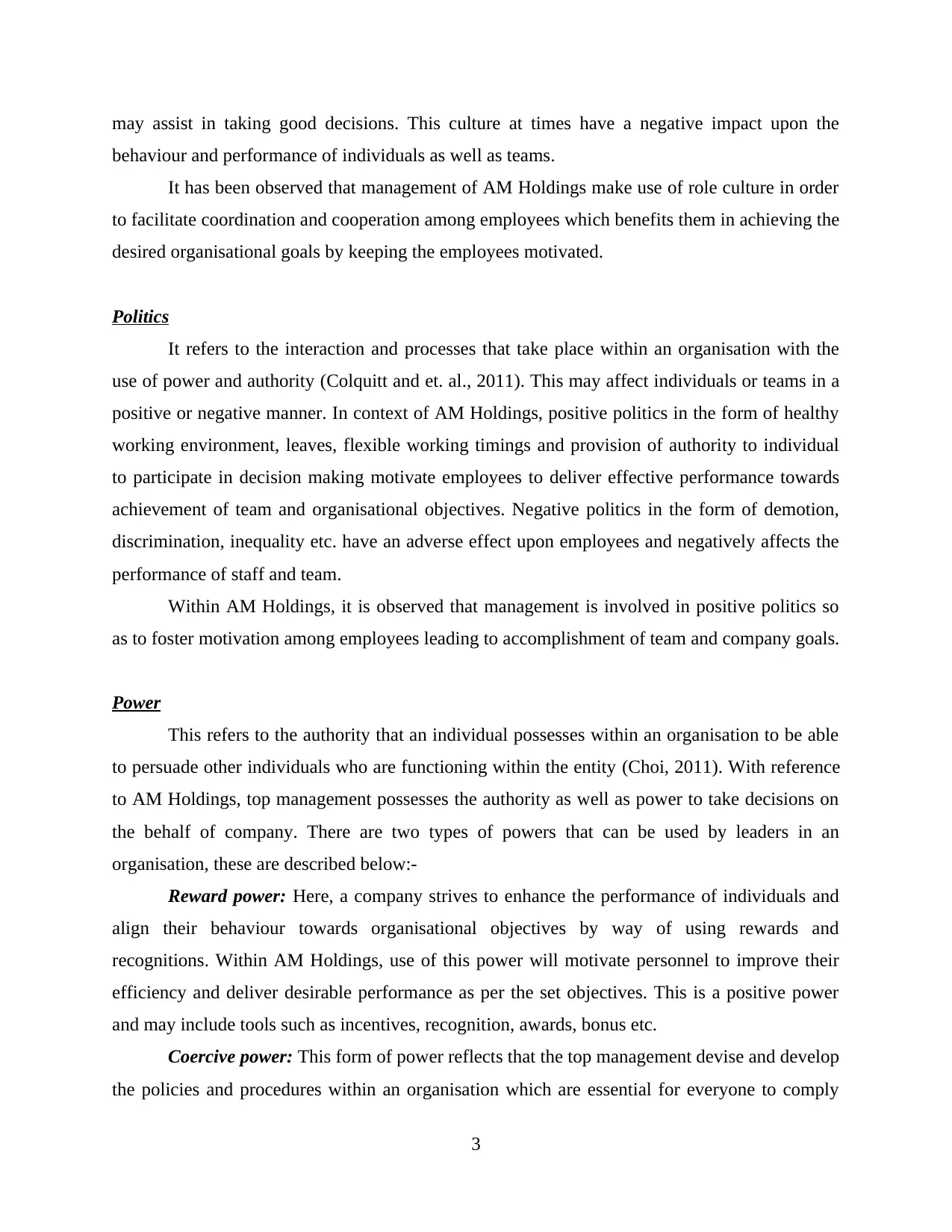
may assist in taking good decisions. This culture at times have a negative impact upon the
behaviour and performance of individuals as well as teams.
It has been observed that management of AM Holdings make use of role culture in order
to facilitate coordination and cooperation among employees which benefits them in achieving the
desired organisational goals by keeping the employees motivated.
Politics
It refers to the interaction and processes that take place within an organisation with the
use of power and authority (Colquitt and et. al., 2011). This may affect individuals or teams in a
positive or negative manner. In context of AM Holdings, positive politics in the form of healthy
working environment, leaves, flexible working timings and provision of authority to individual
to participate in decision making motivate employees to deliver effective performance towards
achievement of team and organisational objectives. Negative politics in the form of demotion,
discrimination, inequality etc. have an adverse effect upon employees and negatively affects the
performance of staff and team.
Within AM Holdings, it is observed that management is involved in positive politics so
as to foster motivation among employees leading to accomplishment of team and company goals.
Power
This refers to the authority that an individual possesses within an organisation to be able
to persuade other individuals who are functioning within the entity (Choi, 2011). With reference
to AM Holdings, top management possesses the authority as well as power to take decisions on
the behalf of company. There are two types of powers that can be used by leaders in an
organisation, these are described below:-
Reward power: Here, a company strives to enhance the performance of individuals and
align their behaviour towards organisational objectives by way of using rewards and
recognitions. Within AM Holdings, use of this power will motivate personnel to improve their
efficiency and deliver desirable performance as per the set objectives. This is a positive power
and may include tools such as incentives, recognition, awards, bonus etc.
Coercive power: This form of power reflects that the top management devise and develop
the policies and procedures within an organisation which are essential for everyone to comply
3
behaviour and performance of individuals as well as teams.
It has been observed that management of AM Holdings make use of role culture in order
to facilitate coordination and cooperation among employees which benefits them in achieving the
desired organisational goals by keeping the employees motivated.
Politics
It refers to the interaction and processes that take place within an organisation with the
use of power and authority (Colquitt and et. al., 2011). This may affect individuals or teams in a
positive or negative manner. In context of AM Holdings, positive politics in the form of healthy
working environment, leaves, flexible working timings and provision of authority to individual
to participate in decision making motivate employees to deliver effective performance towards
achievement of team and organisational objectives. Negative politics in the form of demotion,
discrimination, inequality etc. have an adverse effect upon employees and negatively affects the
performance of staff and team.
Within AM Holdings, it is observed that management is involved in positive politics so
as to foster motivation among employees leading to accomplishment of team and company goals.
Power
This refers to the authority that an individual possesses within an organisation to be able
to persuade other individuals who are functioning within the entity (Choi, 2011). With reference
to AM Holdings, top management possesses the authority as well as power to take decisions on
the behalf of company. There are two types of powers that can be used by leaders in an
organisation, these are described below:-
Reward power: Here, a company strives to enhance the performance of individuals and
align their behaviour towards organisational objectives by way of using rewards and
recognitions. Within AM Holdings, use of this power will motivate personnel to improve their
efficiency and deliver desirable performance as per the set objectives. This is a positive power
and may include tools such as incentives, recognition, awards, bonus etc.
Coercive power: This form of power reflects that the top management devise and develop
the policies and procedures within an organisation which are essential for everyone to comply
3
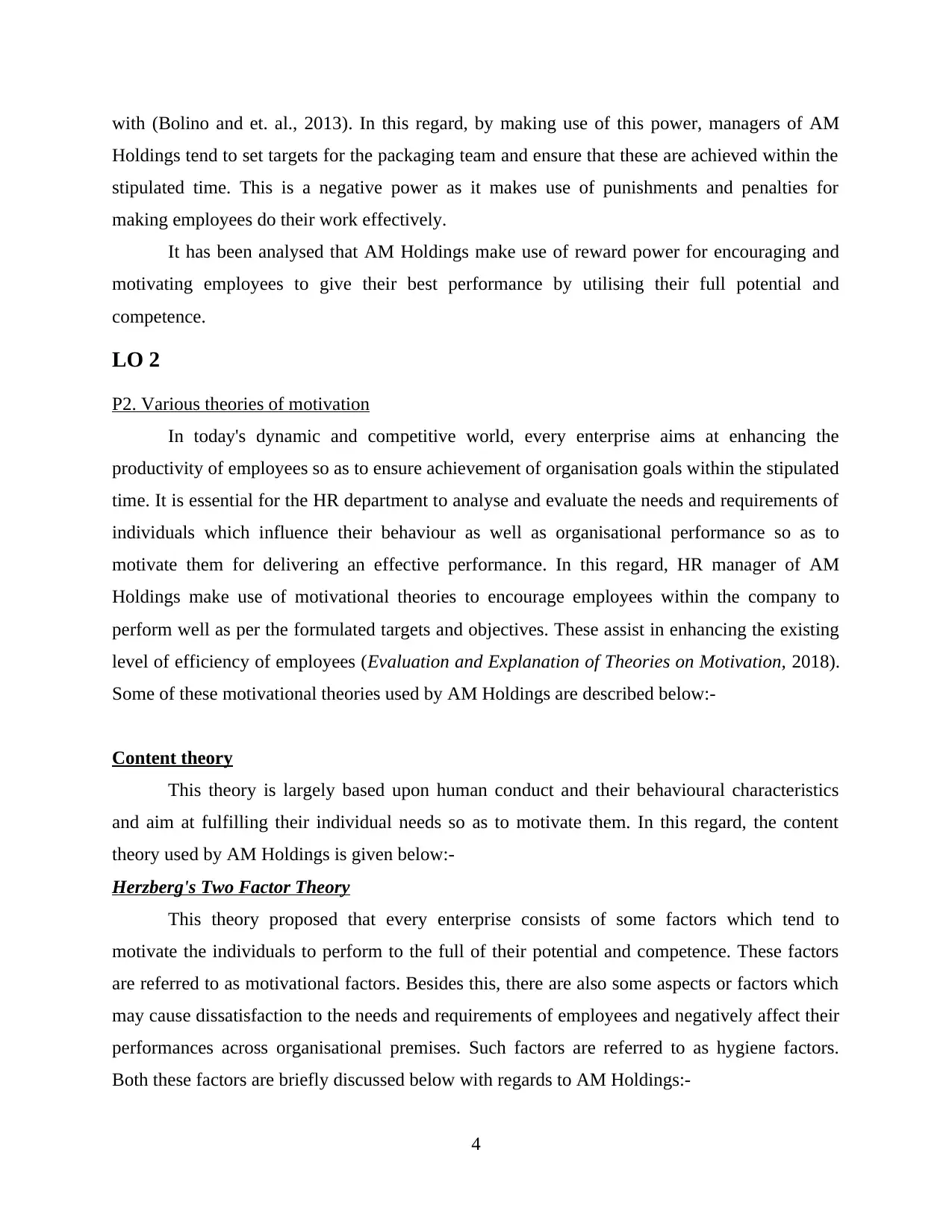
with (Bolino and et. al., 2013). In this regard, by making use of this power, managers of AM
Holdings tend to set targets for the packaging team and ensure that these are achieved within the
stipulated time. This is a negative power as it makes use of punishments and penalties for
making employees do their work effectively.
It has been analysed that AM Holdings make use of reward power for encouraging and
motivating employees to give their best performance by utilising their full potential and
competence.
LO 2
P2. Various theories of motivation
In today's dynamic and competitive world, every enterprise aims at enhancing the
productivity of employees so as to ensure achievement of organisation goals within the stipulated
time. It is essential for the HR department to analyse and evaluate the needs and requirements of
individuals which influence their behaviour as well as organisational performance so as to
motivate them for delivering an effective performance. In this regard, HR manager of AM
Holdings make use of motivational theories to encourage employees within the company to
perform well as per the formulated targets and objectives. These assist in enhancing the existing
level of efficiency of employees (Evaluation and Explanation of Theories on Motivation, 2018).
Some of these motivational theories used by AM Holdings are described below:-
Content theory
This theory is largely based upon human conduct and their behavioural characteristics
and aim at fulfilling their individual needs so as to motivate them. In this regard, the content
theory used by AM Holdings is given below:-
Herzberg's Two Factor Theory
This theory proposed that every enterprise consists of some factors which tend to
motivate the individuals to perform to the full of their potential and competence. These factors
are referred to as motivational factors. Besides this, there are also some aspects or factors which
may cause dissatisfaction to the needs and requirements of employees and negatively affect their
performances across organisational premises. Such factors are referred to as hygiene factors.
Both these factors are briefly discussed below with regards to AM Holdings:-
4
Holdings tend to set targets for the packaging team and ensure that these are achieved within the
stipulated time. This is a negative power as it makes use of punishments and penalties for
making employees do their work effectively.
It has been analysed that AM Holdings make use of reward power for encouraging and
motivating employees to give their best performance by utilising their full potential and
competence.
LO 2
P2. Various theories of motivation
In today's dynamic and competitive world, every enterprise aims at enhancing the
productivity of employees so as to ensure achievement of organisation goals within the stipulated
time. It is essential for the HR department to analyse and evaluate the needs and requirements of
individuals which influence their behaviour as well as organisational performance so as to
motivate them for delivering an effective performance. In this regard, HR manager of AM
Holdings make use of motivational theories to encourage employees within the company to
perform well as per the formulated targets and objectives. These assist in enhancing the existing
level of efficiency of employees (Evaluation and Explanation of Theories on Motivation, 2018).
Some of these motivational theories used by AM Holdings are described below:-
Content theory
This theory is largely based upon human conduct and their behavioural characteristics
and aim at fulfilling their individual needs so as to motivate them. In this regard, the content
theory used by AM Holdings is given below:-
Herzberg's Two Factor Theory
This theory proposed that every enterprise consists of some factors which tend to
motivate the individuals to perform to the full of their potential and competence. These factors
are referred to as motivational factors. Besides this, there are also some aspects or factors which
may cause dissatisfaction to the needs and requirements of employees and negatively affect their
performances across organisational premises. Such factors are referred to as hygiene factors.
Both these factors are briefly discussed below with regards to AM Holdings:-
4
⊘ This is a preview!⊘
Do you want full access?
Subscribe today to unlock all pages.

Trusted by 1+ million students worldwide
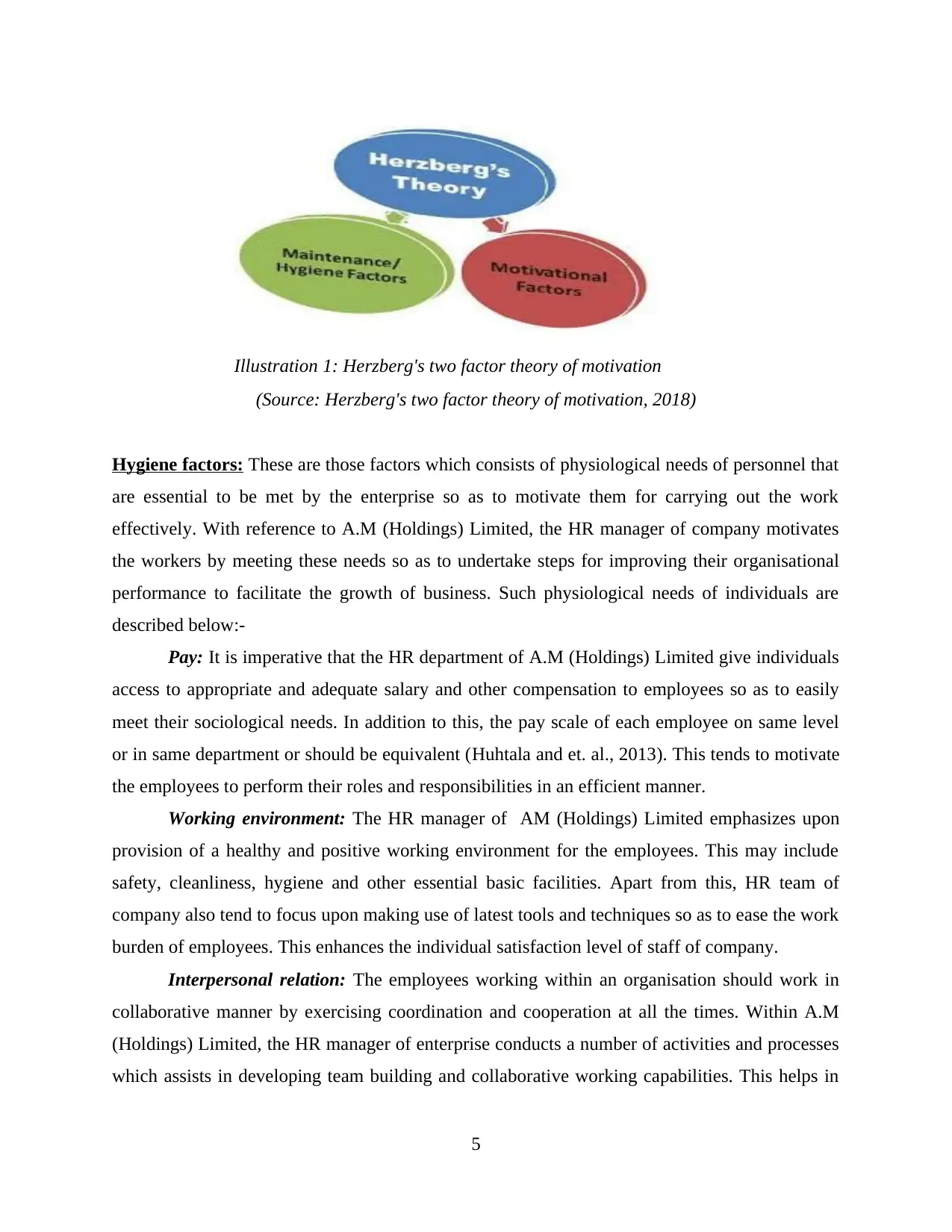
(Source: Herzberg's two factor theory of motivation, 2018)
Hygiene factors: These are those factors which consists of physiological needs of personnel that
are essential to be met by the enterprise so as to motivate them for carrying out the work
effectively. With reference to A.M (Holdings) Limited, the HR manager of company motivates
the workers by meeting these needs so as to undertake steps for improving their organisational
performance to facilitate the growth of business. Such physiological needs of individuals are
described below:-
Pay: It is imperative that the HR department of A.M (Holdings) Limited give individuals
access to appropriate and adequate salary and other compensation to employees so as to easily
meet their sociological needs. In addition to this, the pay scale of each employee on same level
or in same department or should be equivalent (Huhtala and et. al., 2013). This tends to motivate
the employees to perform their roles and responsibilities in an efficient manner.
Working environment: The HR manager of AM (Holdings) Limited emphasizes upon
provision of a healthy and positive working environment for the employees. This may include
safety, cleanliness, hygiene and other essential basic facilities. Apart from this, HR team of
company also tend to focus upon making use of latest tools and techniques so as to ease the work
burden of employees. This enhances the individual satisfaction level of staff of company.
Interpersonal relation: The employees working within an organisation should work in
collaborative manner by exercising coordination and cooperation at all the times. Within A.M
(Holdings) Limited, the HR manager of enterprise conducts a number of activities and processes
which assists in developing team building and collaborative working capabilities. This helps in
5
Illustration 1: Herzberg's two factor theory of motivation
Hygiene factors: These are those factors which consists of physiological needs of personnel that
are essential to be met by the enterprise so as to motivate them for carrying out the work
effectively. With reference to A.M (Holdings) Limited, the HR manager of company motivates
the workers by meeting these needs so as to undertake steps for improving their organisational
performance to facilitate the growth of business. Such physiological needs of individuals are
described below:-
Pay: It is imperative that the HR department of A.M (Holdings) Limited give individuals
access to appropriate and adequate salary and other compensation to employees so as to easily
meet their sociological needs. In addition to this, the pay scale of each employee on same level
or in same department or should be equivalent (Huhtala and et. al., 2013). This tends to motivate
the employees to perform their roles and responsibilities in an efficient manner.
Working environment: The HR manager of AM (Holdings) Limited emphasizes upon
provision of a healthy and positive working environment for the employees. This may include
safety, cleanliness, hygiene and other essential basic facilities. Apart from this, HR team of
company also tend to focus upon making use of latest tools and techniques so as to ease the work
burden of employees. This enhances the individual satisfaction level of staff of company.
Interpersonal relation: The employees working within an organisation should work in
collaborative manner by exercising coordination and cooperation at all the times. Within A.M
(Holdings) Limited, the HR manager of enterprise conducts a number of activities and processes
which assists in developing team building and collaborative working capabilities. This helps in
5
Illustration 1: Herzberg's two factor theory of motivation
Paraphrase This Document
Need a fresh take? Get an instant paraphrase of this document with our AI Paraphraser
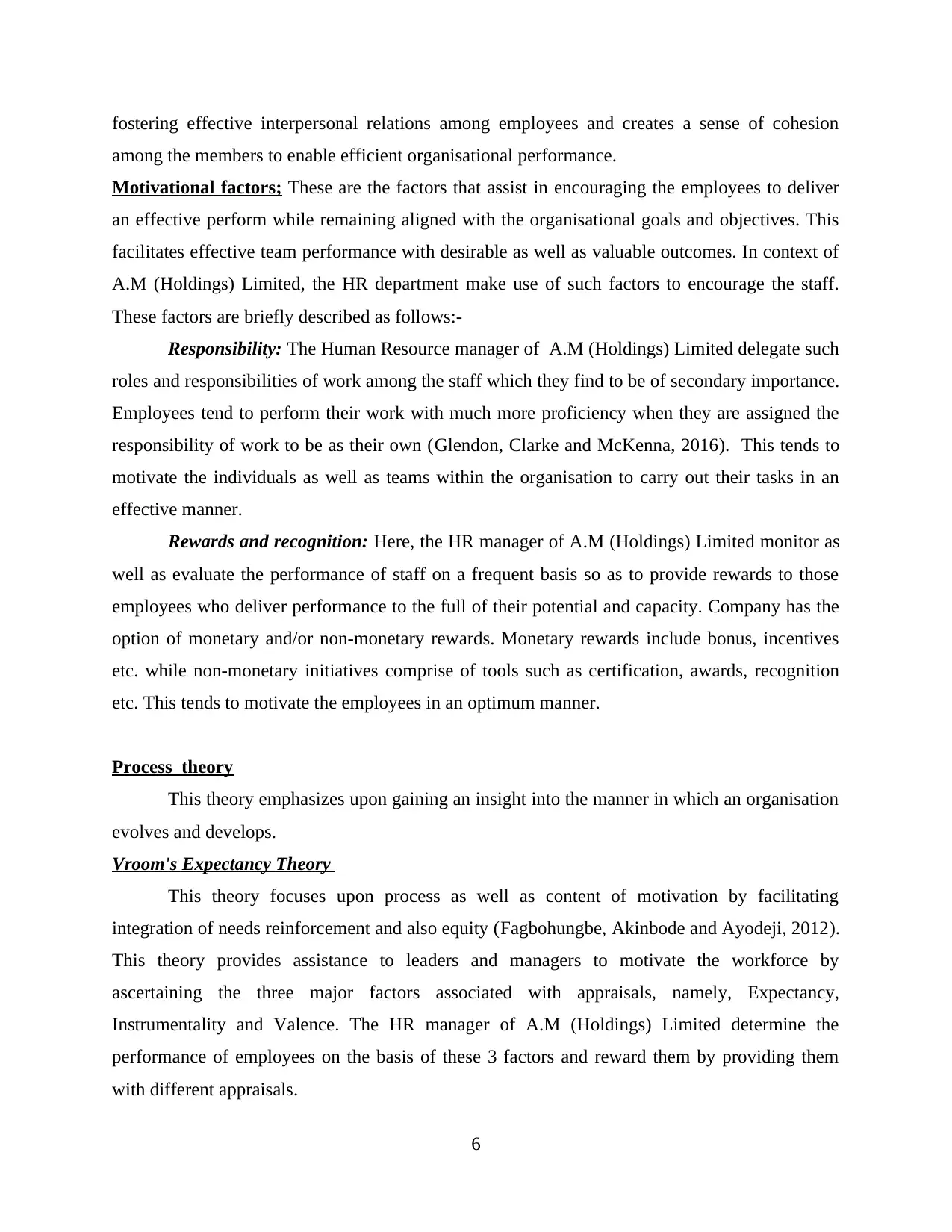
fostering effective interpersonal relations among employees and creates a sense of cohesion
among the members to enable efficient organisational performance.
Motivational factors; These are the factors that assist in encouraging the employees to deliver
an effective perform while remaining aligned with the organisational goals and objectives. This
facilitates effective team performance with desirable as well as valuable outcomes. In context of
A.M (Holdings) Limited, the HR department make use of such factors to encourage the staff.
These factors are briefly described as follows:-
Responsibility: The Human Resource manager of A.M (Holdings) Limited delegate such
roles and responsibilities of work among the staff which they find to be of secondary importance.
Employees tend to perform their work with much more proficiency when they are assigned the
responsibility of work to be as their own (Glendon, Clarke and McKenna, 2016). This tends to
motivate the individuals as well as teams within the organisation to carry out their tasks in an
effective manner.
Rewards and recognition: Here, the HR manager of A.M (Holdings) Limited monitor as
well as evaluate the performance of staff on a frequent basis so as to provide rewards to those
employees who deliver performance to the full of their potential and capacity. Company has the
option of monetary and/or non-monetary rewards. Monetary rewards include bonus, incentives
etc. while non-monetary initiatives comprise of tools such as certification, awards, recognition
etc. This tends to motivate the employees in an optimum manner.
Process theory
This theory emphasizes upon gaining an insight into the manner in which an organisation
evolves and develops.
Vroom's Expectancy Theory
This theory focuses upon process as well as content of motivation by facilitating
integration of needs reinforcement and also equity (Fagbohungbe, Akinbode and Ayodeji, 2012).
This theory provides assistance to leaders and managers to motivate the workforce by
ascertaining the three major factors associated with appraisals, namely, Expectancy,
Instrumentality and Valence. The HR manager of A.M (Holdings) Limited determine the
performance of employees on the basis of these 3 factors and reward them by providing them
with different appraisals.
6
among the members to enable efficient organisational performance.
Motivational factors; These are the factors that assist in encouraging the employees to deliver
an effective perform while remaining aligned with the organisational goals and objectives. This
facilitates effective team performance with desirable as well as valuable outcomes. In context of
A.M (Holdings) Limited, the HR department make use of such factors to encourage the staff.
These factors are briefly described as follows:-
Responsibility: The Human Resource manager of A.M (Holdings) Limited delegate such
roles and responsibilities of work among the staff which they find to be of secondary importance.
Employees tend to perform their work with much more proficiency when they are assigned the
responsibility of work to be as their own (Glendon, Clarke and McKenna, 2016). This tends to
motivate the individuals as well as teams within the organisation to carry out their tasks in an
effective manner.
Rewards and recognition: Here, the HR manager of A.M (Holdings) Limited monitor as
well as evaluate the performance of staff on a frequent basis so as to provide rewards to those
employees who deliver performance to the full of their potential and capacity. Company has the
option of monetary and/or non-monetary rewards. Monetary rewards include bonus, incentives
etc. while non-monetary initiatives comprise of tools such as certification, awards, recognition
etc. This tends to motivate the employees in an optimum manner.
Process theory
This theory emphasizes upon gaining an insight into the manner in which an organisation
evolves and develops.
Vroom's Expectancy Theory
This theory focuses upon process as well as content of motivation by facilitating
integration of needs reinforcement and also equity (Fagbohungbe, Akinbode and Ayodeji, 2012).
This theory provides assistance to leaders and managers to motivate the workforce by
ascertaining the three major factors associated with appraisals, namely, Expectancy,
Instrumentality and Valence. The HR manager of A.M (Holdings) Limited determine the
performance of employees on the basis of these 3 factors and reward them by providing them
with different appraisals.
6
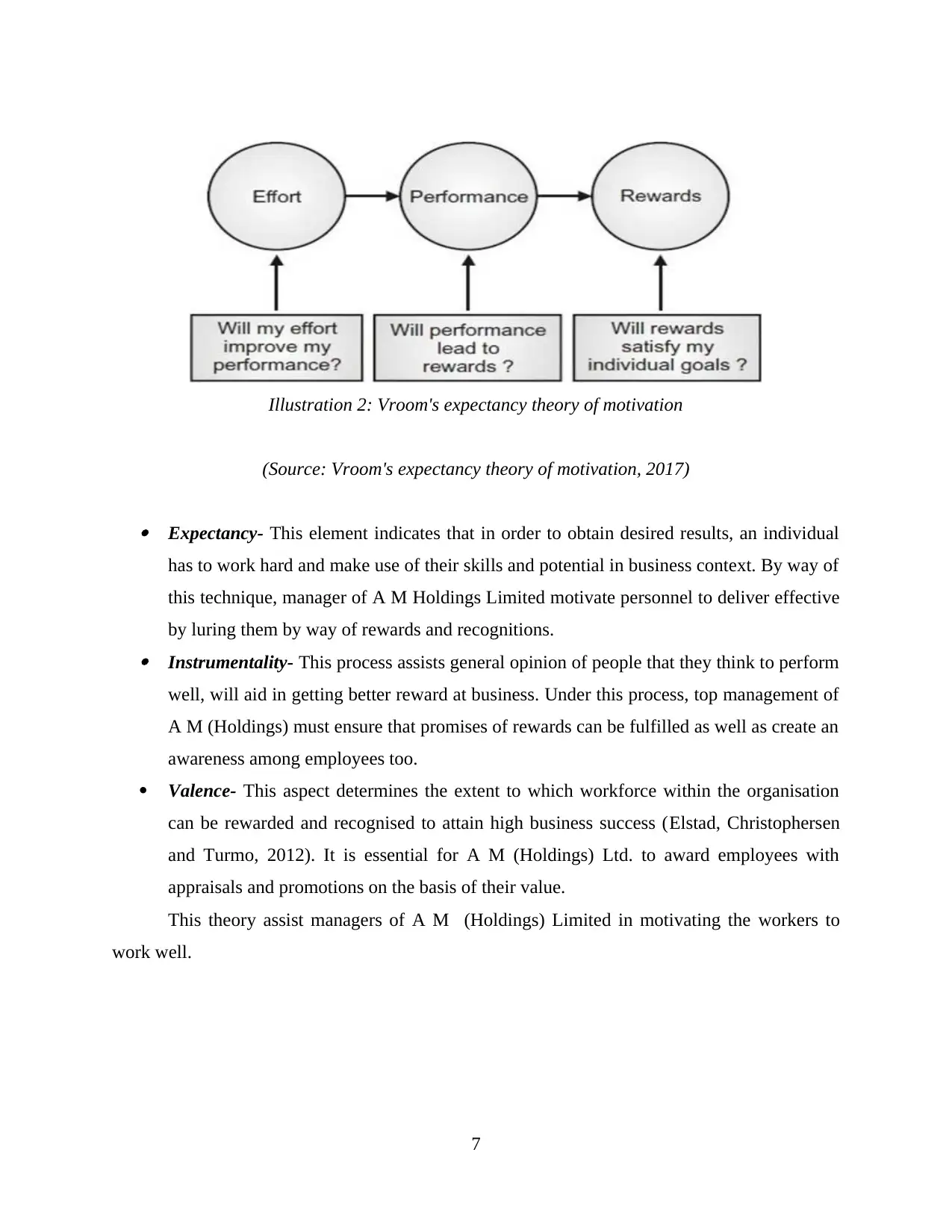
(Source: Vroom's expectancy theory of motivation, 2017)
Expectancy- This element indicates that in order to obtain desired results, an individual
has to work hard and make use of their skills and potential in business context. By way of
this technique, manager of A M Holdings Limited motivate personnel to deliver effective
by luring them by way of rewards and recognitions. Instrumentality- This process assists general opinion of people that they think to perform
well, will aid in getting better reward at business. Under this process, top management of
A M (Holdings) must ensure that promises of rewards can be fulfilled as well as create an
awareness among employees too.
Valence- This aspect determines the extent to which workforce within the organisation
can be rewarded and recognised to attain high business success (Elstad, Christophersen
and Turmo, 2012). It is essential for A M (Holdings) Ltd. to award employees with
appraisals and promotions on the basis of their value.
This theory assist managers of A M (Holdings) Limited in motivating the workers to
work well.
7
Illustration 2: Vroom's expectancy theory of motivation
Expectancy- This element indicates that in order to obtain desired results, an individual
has to work hard and make use of their skills and potential in business context. By way of
this technique, manager of A M Holdings Limited motivate personnel to deliver effective
by luring them by way of rewards and recognitions. Instrumentality- This process assists general opinion of people that they think to perform
well, will aid in getting better reward at business. Under this process, top management of
A M (Holdings) must ensure that promises of rewards can be fulfilled as well as create an
awareness among employees too.
Valence- This aspect determines the extent to which workforce within the organisation
can be rewarded and recognised to attain high business success (Elstad, Christophersen
and Turmo, 2012). It is essential for A M (Holdings) Ltd. to award employees with
appraisals and promotions on the basis of their value.
This theory assist managers of A M (Holdings) Limited in motivating the workers to
work well.
7
Illustration 2: Vroom's expectancy theory of motivation
⊘ This is a preview!⊘
Do you want full access?
Subscribe today to unlock all pages.

Trusted by 1+ million students worldwide
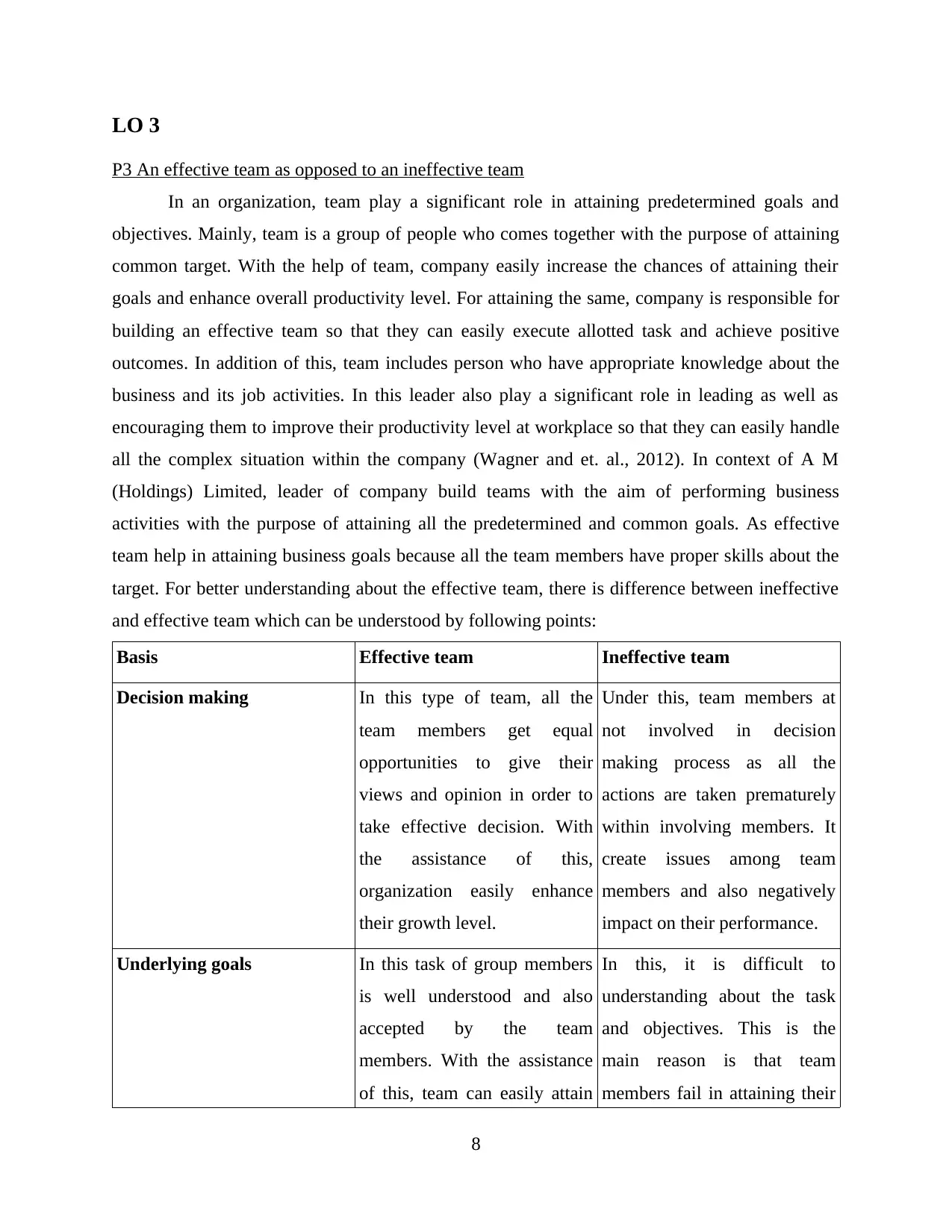
LO 3
P3 An effective team as opposed to an ineffective team
In an organization, team play a significant role in attaining predetermined goals and
objectives. Mainly, team is a group of people who comes together with the purpose of attaining
common target. With the help of team, company easily increase the chances of attaining their
goals and enhance overall productivity level. For attaining the same, company is responsible for
building an effective team so that they can easily execute allotted task and achieve positive
outcomes. In addition of this, team includes person who have appropriate knowledge about the
business and its job activities. In this leader also play a significant role in leading as well as
encouraging them to improve their productivity level at workplace so that they can easily handle
all the complex situation within the company (Wagner and et. al., 2012). In context of A M
(Holdings) Limited, leader of company build teams with the aim of performing business
activities with the purpose of attaining all the predetermined and common goals. As effective
team help in attaining business goals because all the team members have proper skills about the
target. For better understanding about the effective team, there is difference between ineffective
and effective team which can be understood by following points:
Basis Effective team Ineffective team
Decision making In this type of team, all the
team members get equal
opportunities to give their
views and opinion in order to
take effective decision. With
the assistance of this,
organization easily enhance
their growth level.
Under this, team members at
not involved in decision
making process as all the
actions are taken prematurely
within involving members. It
create issues among team
members and also negatively
impact on their performance.
Underlying goals In this task of group members
is well understood and also
accepted by the team
members. With the assistance
of this, team can easily attain
In this, it is difficult to
understanding about the task
and objectives. This is the
main reason is that team
members fail in attaining their
8
P3 An effective team as opposed to an ineffective team
In an organization, team play a significant role in attaining predetermined goals and
objectives. Mainly, team is a group of people who comes together with the purpose of attaining
common target. With the help of team, company easily increase the chances of attaining their
goals and enhance overall productivity level. For attaining the same, company is responsible for
building an effective team so that they can easily execute allotted task and achieve positive
outcomes. In addition of this, team includes person who have appropriate knowledge about the
business and its job activities. In this leader also play a significant role in leading as well as
encouraging them to improve their productivity level at workplace so that they can easily handle
all the complex situation within the company (Wagner and et. al., 2012). In context of A M
(Holdings) Limited, leader of company build teams with the aim of performing business
activities with the purpose of attaining all the predetermined and common goals. As effective
team help in attaining business goals because all the team members have proper skills about the
target. For better understanding about the effective team, there is difference between ineffective
and effective team which can be understood by following points:
Basis Effective team Ineffective team
Decision making In this type of team, all the
team members get equal
opportunities to give their
views and opinion in order to
take effective decision. With
the assistance of this,
organization easily enhance
their growth level.
Under this, team members at
not involved in decision
making process as all the
actions are taken prematurely
within involving members. It
create issues among team
members and also negatively
impact on their performance.
Underlying goals In this task of group members
is well understood and also
accepted by the team
members. With the assistance
of this, team can easily attain
In this, it is difficult to
understanding about the task
and objectives. This is the
main reason is that team
members fail in attaining their
8
Paraphrase This Document
Need a fresh take? Get an instant paraphrase of this document with our AI Paraphraser
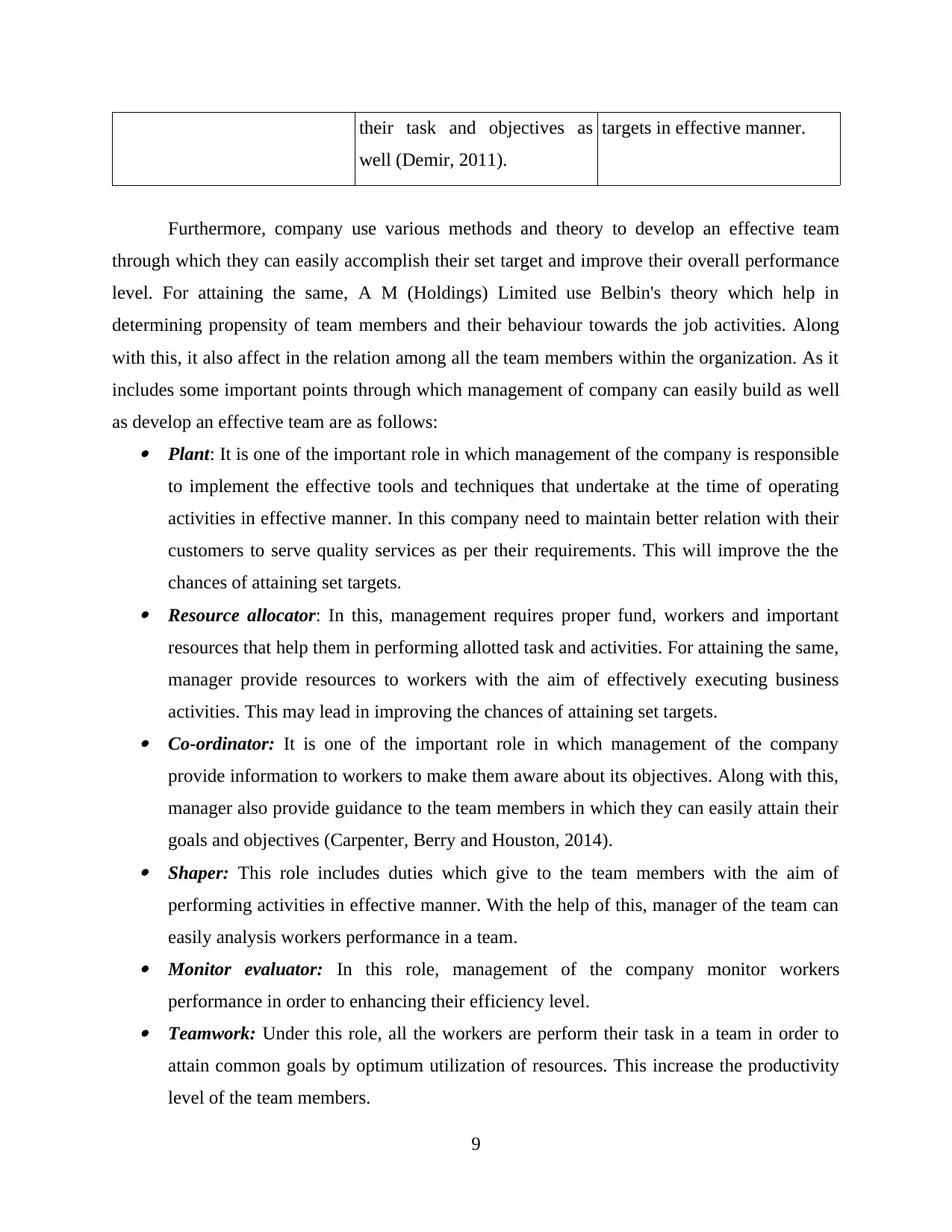
their task and objectives as
well (Demir, 2011).
targets in effective manner.
Furthermore, company use various methods and theory to develop an effective team
through which they can easily accomplish their set target and improve their overall performance
level. For attaining the same, A M (Holdings) Limited use Belbin's theory which help in
determining propensity of team members and their behaviour towards the job activities. Along
with this, it also affect in the relation among all the team members within the organization. As it
includes some important points through which management of company can easily build as well
as develop an effective team are as follows: Plant: It is one of the important role in which management of the company is responsible
to implement the effective tools and techniques that undertake at the time of operating
activities in effective manner. In this company need to maintain better relation with their
customers to serve quality services as per their requirements. This will improve the the
chances of attaining set targets. Resource allocator: In this, management requires proper fund, workers and important
resources that help them in performing allotted task and activities. For attaining the same,
manager provide resources to workers with the aim of effectively executing business
activities. This may lead in improving the chances of attaining set targets. Co-ordinator: It is one of the important role in which management of the company
provide information to workers to make them aware about its objectives. Along with this,
manager also provide guidance to the team members in which they can easily attain their
goals and objectives (Carpenter, Berry and Houston, 2014). Shaper: This role includes duties which give to the team members with the aim of
performing activities in effective manner. With the help of this, manager of the team can
easily analysis workers performance in a team. Monitor evaluator: In this role, management of the company monitor workers
performance in order to enhancing their efficiency level. Teamwork: Under this role, all the workers are perform their task in a team in order to
attain common goals by optimum utilization of resources. This increase the productivity
level of the team members.
9
well (Demir, 2011).
targets in effective manner.
Furthermore, company use various methods and theory to develop an effective team
through which they can easily accomplish their set target and improve their overall performance
level. For attaining the same, A M (Holdings) Limited use Belbin's theory which help in
determining propensity of team members and their behaviour towards the job activities. Along
with this, it also affect in the relation among all the team members within the organization. As it
includes some important points through which management of company can easily build as well
as develop an effective team are as follows: Plant: It is one of the important role in which management of the company is responsible
to implement the effective tools and techniques that undertake at the time of operating
activities in effective manner. In this company need to maintain better relation with their
customers to serve quality services as per their requirements. This will improve the the
chances of attaining set targets. Resource allocator: In this, management requires proper fund, workers and important
resources that help them in performing allotted task and activities. For attaining the same,
manager provide resources to workers with the aim of effectively executing business
activities. This may lead in improving the chances of attaining set targets. Co-ordinator: It is one of the important role in which management of the company
provide information to workers to make them aware about its objectives. Along with this,
manager also provide guidance to the team members in which they can easily attain their
goals and objectives (Carpenter, Berry and Houston, 2014). Shaper: This role includes duties which give to the team members with the aim of
performing activities in effective manner. With the help of this, manager of the team can
easily analysis workers performance in a team. Monitor evaluator: In this role, management of the company monitor workers
performance in order to enhancing their efficiency level. Teamwork: Under this role, all the workers are perform their task in a team in order to
attain common goals by optimum utilization of resources. This increase the productivity
level of the team members.
9
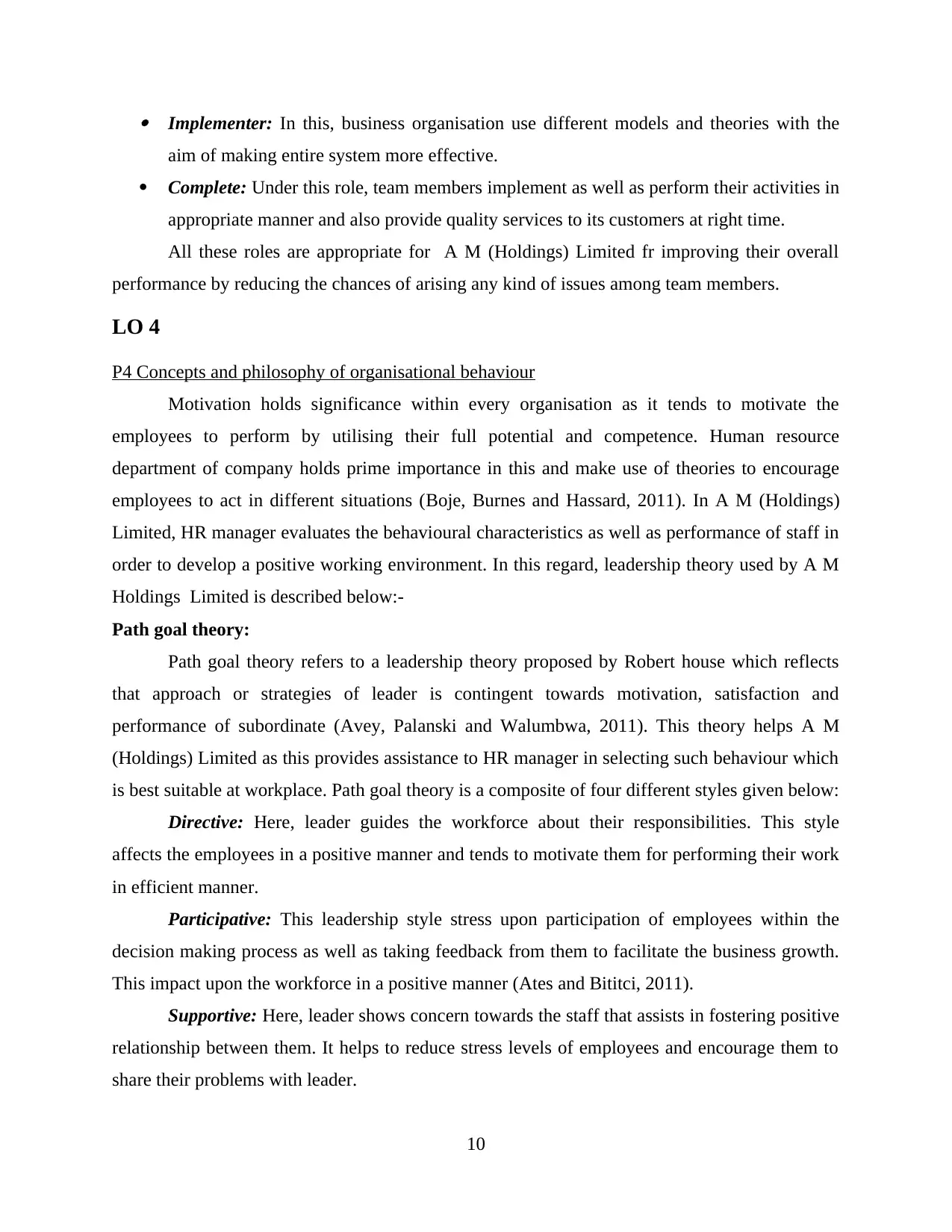
Implementer: In this, business organisation use different models and theories with the
aim of making entire system more effective.
Complete: Under this role, team members implement as well as perform their activities in
appropriate manner and also provide quality services to its customers at right time.
All these roles are appropriate for A M (Holdings) Limited fr improving their overall
performance by reducing the chances of arising any kind of issues among team members.
LO 4
P4 Concepts and philosophy of organisational behaviour
Motivation holds significance within every organisation as it tends to motivate the
employees to perform by utilising their full potential and competence. Human resource
department of company holds prime importance in this and make use of theories to encourage
employees to act in different situations (Boje, Burnes and Hassard, 2011). In A M (Holdings)
Limited, HR manager evaluates the behavioural characteristics as well as performance of staff in
order to develop a positive working environment. In this regard, leadership theory used by A M
Holdings Limited is described below:-
Path goal theory:
Path goal theory refers to a leadership theory proposed by Robert house which reflects
that approach or strategies of leader is contingent towards motivation, satisfaction and
performance of subordinate (Avey, Palanski and Walumbwa, 2011). This theory helps A M
(Holdings) Limited as this provides assistance to HR manager in selecting such behaviour which
is best suitable at workplace. Path goal theory is a composite of four different styles given below:
Directive: Here, leader guides the workforce about their responsibilities. This style
affects the employees in a positive manner and tends to motivate them for performing their work
in efficient manner.
Participative: This leadership style stress upon participation of employees within the
decision making process as well as taking feedback from them to facilitate the business growth.
This impact upon the workforce in a positive manner (Ates and Bititci, 2011).
Supportive: Here, leader shows concern towards the staff that assists in fostering positive
relationship between them. It helps to reduce stress levels of employees and encourage them to
share their problems with leader.
10
aim of making entire system more effective.
Complete: Under this role, team members implement as well as perform their activities in
appropriate manner and also provide quality services to its customers at right time.
All these roles are appropriate for A M (Holdings) Limited fr improving their overall
performance by reducing the chances of arising any kind of issues among team members.
LO 4
P4 Concepts and philosophy of organisational behaviour
Motivation holds significance within every organisation as it tends to motivate the
employees to perform by utilising their full potential and competence. Human resource
department of company holds prime importance in this and make use of theories to encourage
employees to act in different situations (Boje, Burnes and Hassard, 2011). In A M (Holdings)
Limited, HR manager evaluates the behavioural characteristics as well as performance of staff in
order to develop a positive working environment. In this regard, leadership theory used by A M
Holdings Limited is described below:-
Path goal theory:
Path goal theory refers to a leadership theory proposed by Robert house which reflects
that approach or strategies of leader is contingent towards motivation, satisfaction and
performance of subordinate (Avey, Palanski and Walumbwa, 2011). This theory helps A M
(Holdings) Limited as this provides assistance to HR manager in selecting such behaviour which
is best suitable at workplace. Path goal theory is a composite of four different styles given below:
Directive: Here, leader guides the workforce about their responsibilities. This style
affects the employees in a positive manner and tends to motivate them for performing their work
in efficient manner.
Participative: This leadership style stress upon participation of employees within the
decision making process as well as taking feedback from them to facilitate the business growth.
This impact upon the workforce in a positive manner (Ates and Bititci, 2011).
Supportive: Here, leader shows concern towards the staff that assists in fostering positive
relationship between them. It helps to reduce stress levels of employees and encourage them to
share their problems with leader.
10
⊘ This is a preview!⊘
Do you want full access?
Subscribe today to unlock all pages.

Trusted by 1+ million students worldwide
1 out of 14
Related Documents
Your All-in-One AI-Powered Toolkit for Academic Success.
+13062052269
info@desklib.com
Available 24*7 on WhatsApp / Email
![[object Object]](/_next/static/media/star-bottom.7253800d.svg)
Unlock your academic potential
Copyright © 2020–2026 A2Z Services. All Rights Reserved. Developed and managed by ZUCOL.





